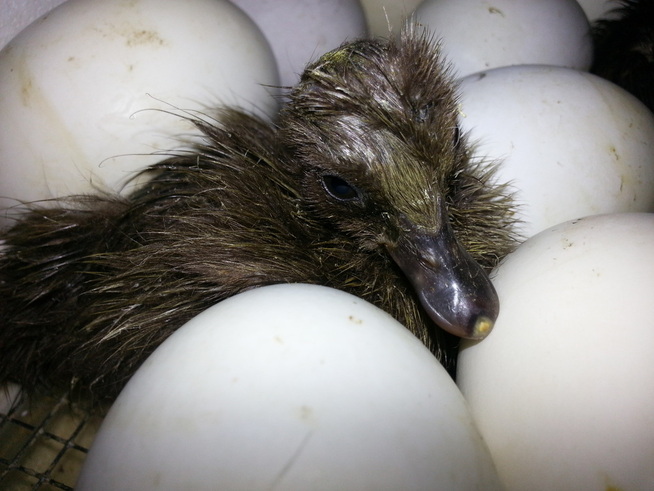 Straight out of the egg, still in the incubator, a Khaki Campbell duckling sits snuggled to the other eggs. Note his egg tooth at the tip of his bill.
Straight out of the egg, still in the incubator, a Khaki Campbell duckling sits snuggled to the other eggs. Note his egg tooth at the tip of his bill. I am not thrilled to hatch eggs as many are. The little ones are very cute for sure and they have little birdie ways that are fun to watch too, though I would rather leave the hatching aspect to others who really enjoy it or the mother hens themselves. The electricity to run the incubator for 21 or 28 days , 24 hours a day, is considerable. Then the babies have to be put under a heat lamp in a brooder for 4 weeks, again an expensive proposition. The trouble is that Khaki Campbells seldom, or rarely, ever hatch their own eggs and Saxony and Rouen ducks are not known to do so much either, so if more ducklings are desired, hatching the eggs in an incubator is the only and usual way. This is the second generation hatch, which means that some of the eggs are fertilized by a brother or father. Next year, I plan to look for new drakes for the Campbells and Rouens so there are fresh genes. Many people have trouble hatching duck eggs, so I know I am not alone with the poor results. I washed the poop off the eggs, something that is controversial. Some say that the eggs should only be dry brushed and others are fine with washing the eggs. They were not sparkling clean by any means, but the big lumps were certainly washed off. Maybe washing the 'bloom' from the egg harms the chicks in some way. The bloom is the final covering the mother coats her eggs with to seal them while allowing the contents to breathe. The outside bacteria does not enter though, which is why unwashed eggs can sit on a counter at room temperature for a long time and not go bad, where as eggs that are washed and refrigerated do go stale rather quickly, since the washing has removed the 'bloom' which then allows bacteria and air to enter the egg.
We shall see over the next 5 days how many of the remaining eggs hatch. I sold 3 of the ducklings today, the Campbells. The remaining Rouen is in with the 3 bantam cross chicks that hatched in the old Bower incubator a few days earlier. Until then...

 RSS Feed
RSS Feed